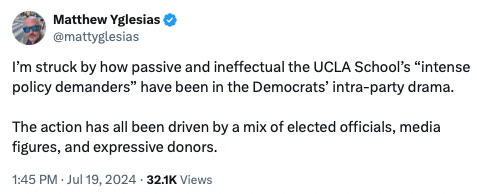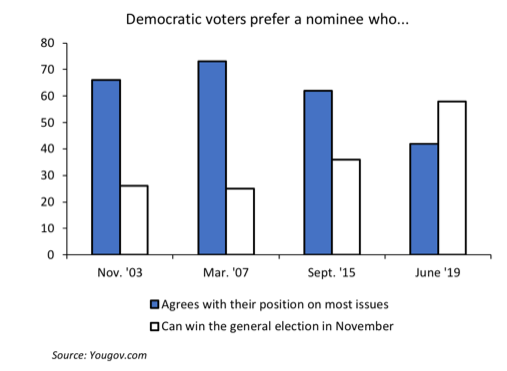The Dump Biden movement is part of an ongoing factional rift
Race, gender, and the divide within the Democratic Party
You may have heard that there’s a fight going on within the Democratic Party over whether Joe Biden should be nominated for a second term next month. I want to describe the contours of this fight in light of what we know about how parties behave. As with many fights within the Democratic Party, race and gender are at the heart of this one, even if it’s not always expressed that way.
Matthew Yglesias recently called out parties scholars about what’s going on within the Democratic Party:
For those unfamiliar with the term, the “UCLA School” refers to a coterie of scholars1 advocating a vision of American political parties as driven by interests and elites who, even in an age of primary elections, can steer nominations through their allocation of campaign resources. This is a view of parties as largely under the control of policy-demanding organizers, rather than election-minded politicians. And if I understand Yglesias’ critique correctly, he’s wondering if this theory really explains what’s going on within the party right now. (Spoiler: I think it does.)
I don’t think what the Democratic Party is doing now is that different from what it did in 2020. Since Donald Trump won in 2016, Democrats have been overwhelmingly focused on removing him from office and keeping him out, sometimes even to the detriment of policy gains.
The graph below, reproduced from my 2020 book Learning From Loss, shows the result of a YouGov survey asking Democrats whether they prefer a presidential candidate they agree with versus one they think can win. The 2020 cycle showed a sharp departure from the past; Democrats overall were less concerned about policy than they were about finding someone who could defeat Trump. And they were willing to cast aside much of the largest and most diverse field of candidates they’d ever seen in favor of Joe Biden, whom they saw as more electable. Much of the party now is still in that same place they were four years ago; they’ve just decided that Biden is not the most electable nominee.
Some of this ramped-up concern about electability in 2020 came from Democratic voters themselves, of course, but some of it came from Democratic elected officials, party insiders, donors, left-leaning journalists, and pundits. These were many of the folks sounding the warning about Bernie Sanders losing to Trump and doing what they could to pressure other candidates out of the race to clear a path for Biden.
Now, importantly, Biden did not have the whole of the party behind him after clinching the nomination in 2020. He made a point of reaching out to Black leaders, to progressives (including his rival Bernie Sanders), to women’s groups, to environmentalists, and others, in an attempt to form a functional governing coalition. These folks are more of what we would consider “intense policy demanders,” putting pressure on Biden to make certain policy and personnel shifts (investment in climate change mitigation, electric vehicle support, student loan forgiveness, support for labor unions, putting people of color on the federal bench, economic support for poorer people, covid relief, etc.) priorities in his new administration.
There’s always tension in such negotiations. Bernie Sanders and his supporters wanted Sanders to be president, but seeing that wasn’t a realistic possibility any more, they were willing to work with Biden and extract what concessions they could from him. Some prominent Black leaders, including Rep. Jim Clyburn and others in the Congressional Black Caucus, may well have wanted to see Kamala Harris or Cory Booker as the Democratic nominee, but they thought that ticket might lose, and were willing to work with Biden on issues of importance to them (such as putting a Black woman on the Supreme Court).
And these relationships have been profitable. Biden, for all his unpopularity and slender congressional majorities, has proven to be a deft policymaker — almost certainly the most productive president on liberal policy goals since Lyndon Johnson.
The dynamics within the party are pretty similar today. Now, as back then, a bunch of officeholders, pundits, journalists, donors, entertainment figures, party insiders, and more, are hyperfixated on electability, and willing to sacrifice much of what the Democratic Party stands for in hopes of a win. (Aaron Sorkin’s apparently sincere proposal that the Democrats nominate the pro-life, anti-union Mitt Romney is a pretty good example of the quality of argument coming from donors and the entertainment world.) But this faction also includes some serious and high profile names within the party, like Barack Obama and Nancy Pelosi, whom Biden isn’t going to just flat out ignore. This group has a set of interests it cares about and thinks those are best served by tossing Biden overboard.
But now, as back then, there are the policy demanders concerned that a) whomever replaced Biden might not do any better against Donald Trump, and b) even if that person did win, they might not be as effective a president on issues they care about. And those in this camp are far more likely to be women or people of color. As this piece by Ja’han Jones notes, Alexandria Ocasio-Cortez has been frustrated by the largely white portion of the party attacking its own nominee instead of directing their attacks at Trump:
[AOC] highlighted the racial, ethnic and class divisions that appear to have formed between the majority of those pining to blow up the ticket — led mostly by white Democrats and media pundits — and those elected officials who feel they and their constituents have too much at stake to upend the process at this point and so are willing to do the work to re-elect Biden-Harris.
Added to this, Black Voters Matter and a group of nearly 1,500 Black women activists have pushed back strongly against the efforts to push Biden out. As the Black Voters Matter statement said,
To the majority of Black Voters, the Biden-Harris ticket has delivered on enough of those promises to stand with this ticket today. In spite of this, the recent nervous cry for Biden to step aside — led largely by white congresspeople, pundits, and donors — threatens to mute and overlook the voices of Black Voters. Such a step by the Democratic Party would not only impact the enthusiasm of Black Voters in this year’s general election, but it would impact Black turnout for decades to come while deepening the widespread belief that the Democratic Party takes our voters for granted.
It is generally helpful to view parties them as coalitions of competing interests, with none of those interests inherently more legitimate than others. Those that are fixated on Biden’s electability now rightly see that you can’t achieve many policy gains if you’re booted from office. Those defending Biden right now recognize full well that he could lose, but they’re not convinced that a replacement would do better in the election or would work as well with them on policy, and they’re concerned that all this in-fighting is increasing the chance that the party loses in the fall.
I don’t know that either side is inherently right or wrong here. Pelosi and AOC are two of the sharpest tacticians in the party and they do not agree in this case. Obviously this recent push to dump Biden has stemmed from his performance in last month’s debate, and that seems to have resulted in Biden’s polling position dropping by about two points. But the push to remove Biden rests on a number of assumptions that are largely unverifiable:
that Biden’s poor debate performance and his aging issues in general would cause people to not vote for him
that another Democratic candidate would perform better in the election without alienating key constituencies
We don’t go into politics with perfect information, of course, but the certitude with which people are making the above assumptions is really quite striking.
My guess is that Biden is slightly more likely than not to withdraw at this point given the range of political pressures on him. But people should recognize that the calls for him to step down, despite being quite loud and well-placed, are not unanimous within the party, that prominent women and people of color are urging him to stay on, and that it is those voices to whom Biden has often listened in the past. And everyone involved has an interest and an axe to grind.
Yes, I consider myself one of the “school”’s more on-line members.







Excellent summary, Seth. I’m sending to my students.
I agree about how stunning it is to see so many people so certain of unknowable things. That said, any estimates of how much damage a late contentions primary/convention does to a party’s chances? I keep thinking it’s a negative all in its own right because its admission of party fallibility.
Also, what’s with the largely white donor class/ pundit position that it’s okay to pass over Harris in favor of the promise of a conversion-produced (white, likely male) savior. Are they nuts? Missing the politics gene? Just convince women, esp Black women, will overlook the insult and fall in line?
I think citing Sorkin is a bit of a straw man here. If you want an an example of "Angry anti-Trump Dem party white guy who wants Biden replaced" party actor Yglesias is a much better example:
"After watching the debate, I think it’s clear that Harris would be better.
Will she rise to the occasion and become a great politician? I hope so. But I wouldn’t count on it. Would she deliver replacement-level performance? I’m quite sure she would. She wouldn’t say “we finally beat Medicare” when she meant “we finally beat the prescription drug companies and let Medicare bargain for lower prices.” She wouldn’t let her opponent repeatedly — and falsely — claim that immigrants are undermining Social Security’s finances when the exact opposite is true. She wouldn’t discuss crime while forgetting to mention that the murder rate is lower now than it was when Trump left office.
I have a lot of ideas about how Harris could be a better politician and a lot of opinions about which politicians would be better than Harris. But she’s a replacement-level Democrat, and at this point, Biden is clearly below that." https://www.slowboring.com/p/honor-demands-joe-biden-step-aside
Or to put it another way Biden is clearly losing in the national and swing state polls. In order to turn that around he needed to 1. Demonstrate during the debate to doubters that he could still do the job 2. Run a vigorous campaign that would generate lots of earned media about why Trump is bad 3. Embrace moderate positions to win back moderates who are open to voting Trump but don't like him.
Biden clearly failed at number one (and his actions after the debate compounded this problem), he doesn't seem capable of two (hence him still running a "rose garden strategy") and in making deals with people like AOC to try to hold on to the nomination that make three impossible.
And I think that's the core DB argument: not that it's impossible Biden can win (elections are weird and anything's possible) but that the Dems chances would improve somewhat with a new nominee that could actually be capable doing those three things I outlined above.